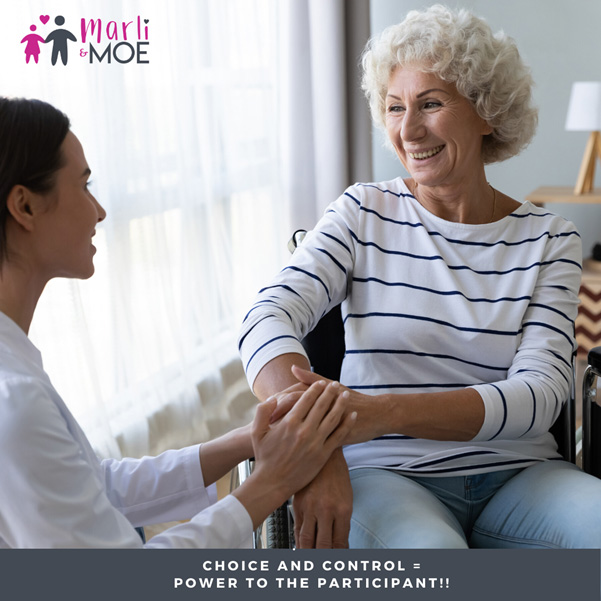NDIS Common Phrases (EP 2) – By Stephanie Gaynor
Thursday, February 13, 2020
What do these phrases mean to you … and what do they mean to the NDIS
Reasonable and Necessary
Choice and Control
Ordinary Life
The above are common phrases that are NDIS staples and are often thrown around willy nilly: Reasonable and Necessary, Choice and Control and Ordinary Life. These can be used as a weapon for both the Participant and the NDIA and its is important to understand these so you can have them in your arsenal!
When supporting participants particularly if they are in a dispute with the NDIS I find pleasure in manipulating these words and supporting the participant to highlight to the NDIS why these words apply to their situation…….
The result of this = the NDIS eating their words, Participant getting outcomes, Pure Joy!!!
Over the next 3 blogs I will explain what each of these 3 phases mean to me, and more importantly to the NDIS.
Catch up on Episode/Blog 1 - Reasonable and Necessary, here; http://www.marliandmoe.com.au/blog/ndis-common-phrases-episode-1
Episode/Blog 2 - Choice and Control
I would say that this is the single most important thing to understand when it comes to the NDIS but I would be lying because I can’t really decide between the above 3 common phrases. And don’t get me started on the importance of the operational guidelines. So I will just settle for; Choice and Control is instrumental and of very high importance.
Choice and Control = Power to the Participant!!
There is nothing to it really, it means that the participant is in control and is the boss of their own life.
What complicates this a little is, that it is such a seismic shift. Historically People with disabilities have been robbed the opportunity to make choices, even having the smallest choices such as what they wear, or if they clean their teeth before or after breakfast made for them.

What is the NDIS’ stance on choice and control?
This is outlined within the Operation guideline > Overview of the NDIS Operational Guideline
Here are some snippets from the above guideline/ NDIS Act
4.4.1 Objects of the NDIS Act
- enable people with disability to exercise choice and control in the pursuit of their goals and the planning and delivery of their supports (section 3(1)(e));
4.4.2 General principles which guide actions under the NDIS Act
- people with disability have the same right as other members of Australian society to be able to determine their own best interests, including the right to exercise choice and control, and to engage as equal partners in decisions that will affect their lives, to the full extent of their capacity (section 4(8));
- people with disability should be supported in all their dealings and communications with the NDIA so that their capacity to exercise choice and control is maximised in a way that is appropriate to their circumstances and cultural needs (section 4(9));
4.4.4 Principles relating to the participation of people with disability
Under the NDIS Act:
- people with disability are assumed, so far as is reasonable in the circumstances, to have capacity to determine their own best interests and make decisions that affect their own lives (section 17A(1));
- people with disability will be supported in their dealings and communications with the Agency so that their capacity to exercise choice and control is maximised (section 17A(2)); (see also communicating with people with disability)
- the NDIS is to:
- Respect the interests of people with disability in exercising choice and control about matters that affect them; and
- enable people with disability to make decisions that will affect their lives, to the extent of their capacity; and
- support people with disability to participate in, and contribute to, social and economic life, to the extent of their ability (section 17A(3)).
What is evident from this is the NDIS has been designed to empower people with disabilities and assumes they have the capacity to make such decisions. This is where accurate reports and evidences are necessary so that the NDIS can provide supports appropriately (if needed). Equally damaging to taking away a persons ability / rights to make decisions is to not adequately support someone to make informed decisions. Uninformed and unsupported decisions can at times put the person in danger.
One important thing to remember is that just because it is your choice to do something it does not mean the NDIS will fund it, for the NDIS to fund it, it still needs to align with Section 34 Reasonable and Necessary.
In practice here are a couple examples:
- I may have a goal to improve my mobility with Assistive technology (wheelchair) but if I choose to aesthetically customise my wheelchair to like it look, mint! That will be at my own additional cost, as this is my choice and is an unnecessary addition.
- “Parental Responsibility”, the NDIS like to use this which I feel is at times is unfair. There have been times when I have had parents of children participants ask for additional funds/support for their child in the way of a Support worker as they are at work or have other commitments. This can be a double-edged sword and very dependent on individual circumstances, more often than not though the NDIS’ response is: No funds will be provided to children for a support worker, as caring their child/ supervising is the role of a parent to do themselves or make other informal care arrangements. The NDIS then follow up with this dimwitted comment: ‘it is the parents choice to go to work, etc.” I understand their stance but sometimes informal support can be very hard to come by for a child with disabilities, if family or friends are not capable of supporting the child’s disability specific needs. I would also argue for most people it is not a choice whether to work or not. It is important that if you find yourself in this situation that you ask the NDIS to assess this individual to your circumstance and not just use the paintbrush of “Well this is your choice and your Parental responsibility.” It is also helpful if you can demonstrate you have exhausted efforts to make other arrangements with friends, family and mainstream supports such as after school care which didn't work out due to your child's specific disability support needs.
That’s the boring policy bits out of the way. We have wrestled the power back and placed it rightfully in the hands of the person those decisions impact. It is important to acknowledge that the sudden task of making decisions big or small can sometimes be overwhelming, foreign and daunting.
One saying I like to reassure my participants with is by Samuel Goldwyn (film producer),
“I’m willing to admit I am not always right, but I am never wrong”
I love this as it acknowledges that we all make mistakes but at the same time reinforces that you originally made that decision in the first place for a reason so whilst it might not have worked out, you weren't wrong to do so.
You also can’t go past the age old albeit corny “Trust your gut” and “Believe in yourself”
Now that we have mustered our confidence let’s look at what this looks like in practice.
- Choosing your own service providers and changing if you want to.
- Using your supports flexibly.
- Deciding what you spend your time doing, not always just going to tenpin bowling cause that is the done thing, but going cause you are damn good at it and have a cracker of a time.
- Deciding who you invite into your home, whether that be funded supports or loved ones.
- Who you share your personal information and or your NDIS Plan.
There is an assumption that this is only possible for people who self manage and have no intellectual disability. That is not true.
Anyone can enhance the flexibility of their supports and ‘Choice and Control’. A small step you can take to give you more choice over providers, is to request to be plan managed. This allows the participant to access both none registered and registered NDIS providers for supports = more choice.
People with intellectual disability can often lead a life where they are their own decision maker. They can also be the Decision maker with a little extra support from someone they trust who supports by breaking down the choice with them helping them to look at the pros and cons and then allowing the person to make their decision.
After all, we all sometimes need advice when making decisions. There are careers in mainstream society built on this, such as; Attorneys, accountants, design consultants or even dietitians to help us make some of those big decisions, this is no different.
This process is called Supported Decision Making, and it is truly beautiful!
I hope you have found this helpful reassuring and empowering. Remember - TRUST YOURSELF, Always!
Here are some Handy Resources on Supported Decision Making:
- Want to know more about Supported decision making Here is a resource to dive into this further, Making Decisions
- Easy English Resource - Helping People Make Decisions provided by the NSW government https://www.publicguardian.justice.nsw.gov.au/Pages/Supported-Decision-Making.aspx
- Supported Decision Making (e-Learning module) by National Disability Services Date: 4/06/2019 to 30/06/2020 - free for NSW residents
- Independent Advisory Council’s Choice and Control
Recent Posts
- 🌸 Mindfulness and Journalling 🌸
- 🎭 Drama Blog: We’re Going on a Bear Hunt 🐻✨
- Origami 🌀
- Big Chop Energy 💇🏼♀️✨
- Real Talk, Real Tears, Real Growth 💖
- When Life Hits You (Literally) – My Ankle Drama 🦶💥
- ✨My Marli Day at the Easter Show 🐣🎡✨
- My First Iftar Dinner 🌙🍽️
- Harmony Day at School – Laming-Town Stall
- Hearing Aids

